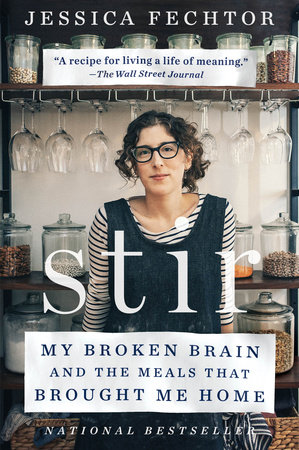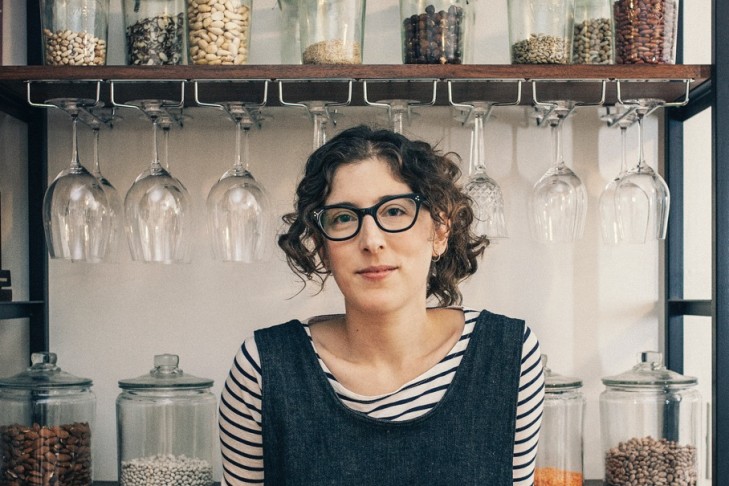When Jessica Fechtor was 28 years old, a blood vessel in her brain burst while she was exercising on a treadmill. Fechtor, who was newly married and pursuing a Ph.D. in Jewish literature at Harvard, had been thinking of starting a family with her husband, Eli. Instead, she faced a long and harrowing recovery filled with complications after her initial surgery. Among them was losing sight in her left eye after her optic nerve was accidentally compressed, as well as temporarily losing her sense of smell.
Fechtor’s memoir, “Stir: My Broken Brain and the Meals That Brought Me Home,” is newly available in paperback. The book, which tells of Fechtor’s health crisis, is also a tribute to her love of cooking. Each chapter in “Stir” ends with a delicious recipe that connects certain foods with a corresponding memory. More of Fechtor’s recipes appear on her blog.
Fechtor recently spoke to JewishBoston about her favorite recipes, the story of her brain aneurysm and the interchangeable roles of being a guest and host in her own home as she was recuperating.
What’s your favorite recipe in the book?
My touchstone recipe is Marcella’s Butter Cake, the first recipe in the book. It’s a very simple cake—butter, flour, eggs, sugar and a little bit of vanilla and almond extract. It comes together by hand in 10 minutes, and then you pour it into a fluted tart pan. And a fluted tart pan is like a secret weapon in the kitchen; you can pour the simplest batter into it and what you get looks so lovely. I sprinkle some toasted sliced almonds and sugar on top.
I was introduced to the recipe in my dad and stepmom’s house. My stepmom, Amy, who is one of the heroes of the book, discovered it in the Columbus Dispatch. She’s the kind of home baker and cook who doesn’t just bake for special occasions. She will see a recipe and decide that she wants to make it because it looks interesting and delicious. That cake was on the counter cooling when I came home from college for winter break. It’s a touchstone for me because it’s really simple—there’s not much to it and yet it’s special. It looks beautiful. It’s a very rich cake, and when I think about the foods I like to eat, and also the way that I like to cook and bake, it’s food that fits that description. As I said in the book, long before I knew who Alice Waters was, my stepmom, Amy, taught me that the best food is food that tastes like itself. This cake is exactly that.
Since Passover is almost upon us, what’s your favorite Passover recipe?
There’s a recipe in the book for an almond macaroon from Hi-Rise Bread Company in Cambridge. The owner, Rene Becker, is a friend and generously offered to give me the recipe for the book. I then converted it into the right proportions for the home baker. I wrote in the book that [Becker’s] father died of a brain aneurysm some years ago. In some ways that recipe was in honor of his father. And the macaroon is unlike any other macaroon I’ve eaten. It’s plump, and chewy on the inside and crispy on the outside. The issue [about making it for Passover] is that different kinds of almond paste have different amounts of sugar. The Solo brand, which is kosher [but not for Passover], is the best. So for Passover I still have to figure out proportions for my own almond paste. When I do, I’ll put it on my blog.
Another favorite is the Cherry Almond Chocolate Chunkies my mother-in-law makes for Passover. Line a square pan with parchment paper and pour melted dark chocolate over almonds and cherries. Let it harden and slice into little squares.
Your account of the day your brain burst is so vivid and immediate. How did you recount those surreal and terrifying details?

The connections between sharing and accepting food are so compelling in the book. What did it feel like to be a guest in your own home as you recovered?
Anybody who’s been sick for a short time knows what it’s like when you can’t do things for yourself and everyone has to help you. We had people bringing food to our home, and then you have this experience where you’re eating food that you didn’t make, but is on your plates and at your table. The first Friday-night dinner that I write about post-surgery was the first time in a long time that we had store-bought challah on our table. I usually bake the challah, and I couldn’t even say the blessing. I just sat there and everything was happening around me. But I had this realization when I was writing the book that we think of being a guest and a host as a binary thing. You are either the guest or the host. But I was thinking that in other languages, like French or Latin, “guest” and “host” are the same word, and context assigns meaning. I realized in many ways I was both.
You have two young daughters. What do you think they’ll take away from your book when they’re old enough to read it?
My older daughter was only 3 when the book was about to come out, and I wanted to have some control over the information she was getting. I didn’t want her to hear scary things, like that I almost died, without it coming from me. My children will have questions and concerns, and I am fully prepared to tell them this story. The questions will change over time, and I will have to tell them the story in new ways as they get older. What I hope they will get from the book when they’re old enough to read it is to have a sense that things happen, and what we make of what happens becomes the reason. I hope that in reading the book and seeing what I made, they will believe that they can make of their lives what they will.



